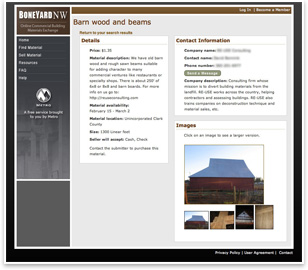
No Bones About It
Making Boneyard easy to use
“We didn’t have $5 million for a facility. We also knew that existing avenues like Craigslist are not set up well for builders and architects. They’re good for swing sets but not for commercial contractors, so there really wasn’t a tool out there for them that worked the same. We wanted to offer everything from telephone poles to soil to heavy mass materials, plus make it easy for the industry to use. For example, the second someone posts information on, say, a door, the buyer will get an email notification.” Making it technically easy to use was especially paramount for another reason, Jacobson explains: “We realized that we have one group, such as demolition contractors, and a second group, such as architects, builders, and developers. But there’s a difference between the two groups as far as computer-user savvy.”
“We didn’t emphasize so much that we are keeping things out of the landfill as opposed to emphasizing the site is a tool,” Jacobson points out. “If it helps someone with a LEED project, that’s great, but we didn’t want to preach.” The White Stag Block rehabilitation project, located adjacent in Portland’s Old Town Historic District, is being showcased as part of the BoneYardNW launch because nearly all of its three buildings are using recycled material. It will house the University of Oregon Portland campus and is seeking LEED Gold certification. |
||
Copyright 2007 The American Institute of Architects. All rights reserved. Home Page |
||
home
news headlines
practice
business
design
recent related
› Architect’s Business Promotes Use of Reclaimed Building Materials
› Beyond Green: Toward an Environmentally Sustainable Convention
› AIA Portland Honors a Bumper Crop of Design Excellence
Did you know . . .
Metro hopes to divert 10,000 tons of Portland’s usable building materials from being thrown away through the use of BoneyardNW.
On a typical 50,000-square-foot commercial office renovation project, contractors could make $10,000-$20,000 off the resale of used building materials, avoiding $5,000 in disposal costs.


 About 20 percent, or 250,000 tons, of waste created in the Portland area is from construction. Metro believes architects, developers, builders, and demolition experts can reuse high-quality, inexpensive salvageable materials, so it created BoneyardNW. Green building in the Northwest also spurred interest in saving material from demolition and disposal.
About 20 percent, or 250,000 tons, of waste created in the Portland area is from construction. Metro believes architects, developers, builders, and demolition experts can reuse high-quality, inexpensive salvageable materials, so it created BoneyardNW. Green building in the Northwest also spurred interest in saving material from demolition and disposal. Throwing architects a bone
Throwing architects a bone Architects can bone up on LEED®
Architects can bone up on LEED®